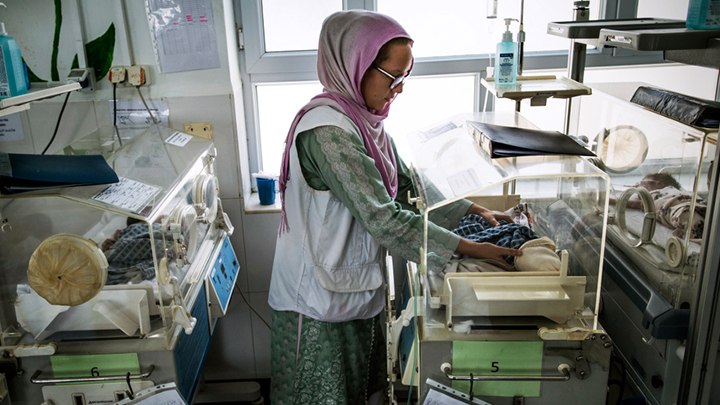
April 24, 2017

Stollery Neonatal Intensive Care Unit (NICU) nurse Sam Hardeman spent nine months in southern Afghanistan, working in a hospital for Médecins Sans Frontières (Doctors without Borders).
Story by Shelly Willsey; Photo courtesy of Kadir Van Lohuien/Noor
Sam Hardeman appreciates the simple things in life.
Things like going out to a movie, hot sauce, and Greek yogurt.
Hardeman saw none of these simple things in Afghanistan for the nine months she worked as a pediatric and neonatal intensive care (NICU) nurse with Médecins Sans Frontières (MSF) — also known as Doctors without Borders.
So it was a major adjustment when she returned to Canada last October, and to nursing in the Stollery NICU at the Royal Alexandra Hospital.
“I had some culture shock coming back to Canada,” says the 28-year-old. “I’d expected it to feel normal, but there was a transition and only so much I could explain about everything I’d experienced.
“In Afghanistan, we were about five km from the front lines, so we could hear bombings every day. In that kind of high-risk area, we had tight security protocols. When not at the hospital, we stayed within our compound, and each day our three-vehicle convoy’s route changed, depending on the day and the potential target buildings.
“You learn to cope with the setting you are in. It was up to us to determine what level of risk we were willing to take. MSF gave us all the information — you have to be comfortable with the security measures in place, follow them, and continually assess if you are OK with being there.”
Fighting between Afghan forces and the Taliban has led to a war-induced breakdown of the country’s public health, security and infrastructure.
Hardeman and 20-plus medical and non-medical expatriates — including physicians, nurses, midwives, project coordinators, and supply logisticians — worked in a hospital in the city of Lashkar Gah, located in Helmand province in the country’s south.
Its NICU often had to accommodate double the number of patients that the 27-bed unit was designed for. Medical supplies were limited, electrical outages were an issue, and the expanding number of patients and their needs taxed the generators.
“I had to change the way I think medically,” says Hardeman. “I couldn’t think about how these kids would be cared for in Canada. I had to change to a realistic mindset of what was possible where I was.”
The unit’s most advanced piece of equipment was an oxygen concentrator. This is in sharp contrast to what is available in Alberta, where ventilators, milk-warming machines, and IV pumps are standard equipment.
Hardeman also saw patient conditions that rarely occur here, including severe acute malnutrition, a polio case and cholera.
In addition, the stress of the constant fighting caused many babies to be born prematurely. Families sometimes had to wait days or weeks until it was safe to travel to the hospital. As a consequence, many infants arrived in critical condition.
“For example, we would see severely malnourished babies who, because they also had diarrhea, were very dehydrated and critically ill,” adds Hardeman. “Sometimes they were already in shock and needed to be rehydrated as quickly as possible and closely monitored.”
Nonetheless, she thrived in this intense work environment.
“It was rewarding. The families are amazing. You interact with patients and their families daily and develop a camaraderie with them. Even when we didn’t have the translator, we found ways to communicate and share the experience.”
MSF is the world's leading independent international medical relief organization, which establishes and manages medical projects in nearly 70 countries.
“MSF has a great support system for returning expats,” says Hardeman. “It just took some time to readjust to regular life. I have great support from my friends and family, so spending time with them really got me feeling home again.”
But she won’t be home for long. This month, Hardeman returns to MSF, this time in south Sudan at a 60-bed pediatric unit within an internally displaced persons camp.
“No matter anyone’s situation or location, everyone deserves access to quality healthcare.”